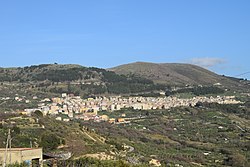Santo Stefano Quisquina
Santo Stefano Quisquina | |
|---|---|
| Comune di Santo Stefano Quisquina | |
 | |
show Location of Santo Stefano Quisquina | |
 Santo Stefano Quisquina Location of Santo Stefano Quisquina in Italy | |
| Coordinates: 37°37′N 13°29′E / 37.617°N 13.483°ECoordinates: 37°37′N 13°29′E / 37.617°N 13.483°E | |
| Country | Italy |
| Region | Sicily |
| Province | Agrigento (AG) |
| Government | |
| • Mayor | Francesco Cacciatore |
| Area | |
| • Total | 85.9 km2 (33.2 sq mi) |
| Elevation | 730 m (2,400 ft) |
| Population (30 November 2016)[3] | |
| • Total | 4,614 |
| • Density | 54/km2 (140/sq mi) |
| Demonym(s) | Stefanesi (also Quisquinesi, Quisquinensi or Timpanisi) |
| Time zone | UTC+1 (CET) |
| • Summer (DST) | UTC+2 (CEST) |
| Postal code | 92020 |
| Dialing code | 0922 |
| Website | Official website |
Santo Stefano Quisquina (Sicilian: Santu Stèfanu Quisquina) is a comune (municipality) in the Province of Agrigento in the Italian region Sicily, located about 60 kilometres (37 mi) south of Palermo and about 35 kilometres (22 mi) north of Agrigento.
It has strong ties with Tampa, in the United States, since its immigrants supplied over 60 percent of the Italian population of the city in the late 19th and early 20th century. The town also supplied a large portion of Italian immigrants to Jacksonville, another city in Florida.[4]
Santo Stefano Quisquina stands at an altitude of 730 metres (2,400 ft) above sea level and borders the following municipalities: Alessandria della Rocca, Bivona, Cammarata, Casteltermini, Castronovo di Sicilia, San Biagio Platani.
History[]
The first nucleus of the present-day town probably dates back to the reign of Frederick II of Aragon (1296–1337), when it was a fief of . Its successive lords were Ruggero Sinisi, Guiscardo de Agijas, the Lacarns and the Ventimiglias.
People[]
- Lorenzo Panepinto (1865 - 1911), a teacher and peasant leader killed by the Sicilian Mafia.
References[]
- ^ "Superficie di Comuni Province e Regioni italiane al 9 ottobre 2011". Istat. Retrieved 16 March 2019.
- ^ "Popolazione Residente al 1° Gennaio 2018". Istat. Retrieved 16 March 2019.
- ^ All demographics and other statistics: Italian statistical institute Istat.
- ^ Gary Ross Mormino; George E. Pozzetta (1987). The immigrant world of Ybor City: Italians and their Latin neighbors in Tampa, 1885-1985. University of Illinois Press. p. 9. ISBN 978-0-252-01351-5.
- Cities and towns in Sicily
- Municipalities of the Province of Agrigento
- Sicily geography stubs


